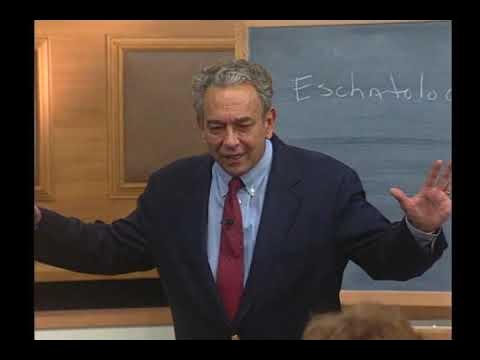Do We Inherit Sin? How to Understand Original Sin | Jonathan Pageau & John Vervaeke
Summary
TLDRThe transcript explores the concept of sin and death as distinct but interconnected ideas, suggesting that sin leads to a state of brokenness or 'death' in various aspects of life. It discusses the inherited brokenness, or 'original sin,' as the consequence of living in a world shaped by past mistakes. The speaker draws parallels with Buddhist karma, emphasizing the influence of inherited patterns on behavior and suffering. The solution proposed is to consciously embrace one's brokenness to avoid being enslaved by it, and to aim towards the 'good' despite the challenges.
Takeaways
- 🔍 Sin and death are related but distinct; sin is the act of missing the mark, while death is the consequence of that act.
- 📜 Scripture suggests that the wages of sin is death, implying a direct causality between sin and death.
- 🍂 We do not inherit Adam's sin, but rather the brokenness and death that resulted from his actions.
- 🌐 The concept of sin causing death applies to all levels of reality, including personal, societal, and global.
- 👶 We are born into a world and families with a history of 'missing the mark,' thus inheriting brokenness.
- 💡 Our aspirations to 'hit the mark' are innate, guiding us towards life despite the inherited brokenness.
- 🧳 The inherited brokenness or 'baggage' from our parents and society can make it harder for us to achieve our aspirations.
- 🌐 Historical and societal patterns, such as racism, contribute to our inherited brokenness and suffering.
- 🙏 Christianity offers a path to overcome this brokenness through embracing and acknowledging one's own sin and death.
- 🕊 Embracing our brokenness consciously can free us from becoming slaves to it, allowing us to see and aim for the good.
- 🛣 The aspiration for the good and the recognition of our dissatisfaction with brokenness can lead to hope and transformation.
Q & A
What is the main distinction made between 'sin' and 'death' in the script?
-The script differentiates 'sin' as the act of missing the mark or purpose, while 'death' is the consequence or the state of brokenness that results from sin.
How does the script interpret the concept of inheriting sin from Adam in the context of scripture?
-The script suggests that scripture does not say we inherit Adam's sin, but rather the brokenness or 'death' that came into the world because of his sin.
What does the script suggest is the purpose of life and how does 'missing the mark' relate to it?
-The purpose of life is to hit the mark or fulfill one's purpose. 'Missing the mark' refers to failing to achieve this purpose, leading to a state of brokenness or 'death'.
How does the script describe the inheritance of brokenness in our lives?
-We inherit brokenness because we are born into families, societies, and systems that have already missed the mark, thus living in a world with inherent brokenness.
What role does aspiration play in the context of living in a broken world according to the script?
-Aspirations guide us and give us the desire to live despite the brokenness. They represent the recognition of a better state and the drive to move towards it.
How does the script relate the concept of original sin to the idea of karma in Buddhism?
-The script draws parallels between original sin and karma, suggesting that we inherit patterns of behavior that affect us and cause suffering, much like the Buddhist concept of karma.
What is the psychological and existential understanding of inheriting brokenness as described in the script?
-It is the idea that we pick up patterns from our parents, friends, and culture that shape us and move us in ways that may be detrimental to our aspirations.
How does the script suggest we deal with the inherited brokenness or 'death'?
-The script suggests embracing the brokenness consciously, acknowledging our own shortcomings, and not blaming others, as a way to avoid becoming slaves to the brokenness.
What does the script propose as the Christian perspective on overcoming the brokenness?
-Christianity, and Christ in particular, shows us that embracing death and brokenness consciously can lead to a recapture of the vision or aim of life, which is the good.
How does the script connect the dissatisfaction found in brokenness to hope?
-The dissatisfaction with brokenness is what causes our suffering, but it also indicates that there is something within us that seeks more than the brokenness, sparking hope.
What is the final message of the script regarding the relationship between sin, death, and our aspirations?
-The final message is that while sin leads to death and brokenness, it is our aspirations and the recognition of a higher good that can guide us towards overcoming these challenges.
Outlines

This section is available to paid users only. Please upgrade to access this part.
Upgrade NowMindmap

This section is available to paid users only. Please upgrade to access this part.
Upgrade NowKeywords

This section is available to paid users only. Please upgrade to access this part.
Upgrade NowHighlights

This section is available to paid users only. Please upgrade to access this part.
Upgrade NowTranscripts

This section is available to paid users only. Please upgrade to access this part.
Upgrade Now5.0 / 5 (0 votes)





